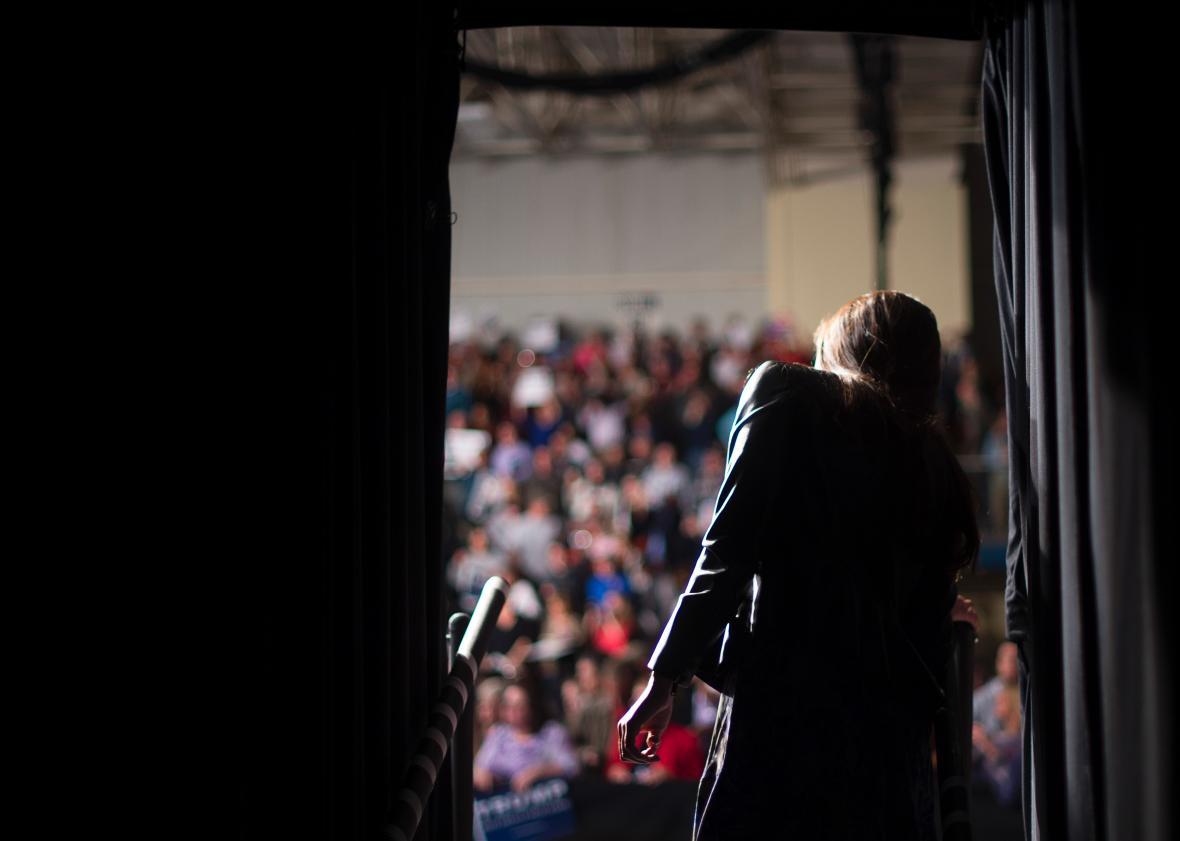Sam Nunberg, a former political adviser to Donald Trump, once told the campaign’s press secretary, Hope Hicks, “You’re like my Peggy, like I’m Don Draper.” As reporter Olivia Nuzzi points out this week in a revealing GQ profile of Hicks, “there was plenty of competition for the role of bizarro Don Draper in the Trump gang”—but Hicks, the only female staffer in Trump’s inner circle, plays the Peggy to all of them. The good people at Trump HQ are already living out their boss’s vision of America, and, surprise! It’s the 1960s.
Hicks, a 27-year-old with no prior political experience, breeds fascination amongst reporters. She found her way to the Donald’s side by way of a P.R. and modeling gig for his daughter Ivanka’s clothing line. An eye-blink later, she’s helping her boss chastise the Pope, smear a female reporter, and avoid all substantive discussion with the press. Nuzzi doesn’t shed much light on how Hicks feels about her career’s unlikely journey—it would have been hard to do so, since Hicks declined to speak with Nuzzi. Instead, the spokeswoman elected to have her boss, and her male colleagues, do the talking for her.
Here’s what does come across about Hicks: She strives to be something of a mini-me to the inscrutable Ivanka, who, as Slate’s Jessica Winter has written, may be the woman closest to Trump in the world. Like most of the women who’ve passed through Trump’s entourage, Hicks is a former model; Cosmopolitan has called her “a dead ringer for supermodel Hilary Rhoda.” She’s “a hugger and a people pleaser,” as Nuzzi puts it, and seems pliable to her boss’s immoderate will: She reportedly wanted to quit the campaign altogether and return to her business job with the Trump organization, but the big man wasn’t a fan of that idea.
The denizens of Trumpworld also want you to know that Hicks is a “sensitive person.” The profile contains multiple anecdotes about former campaign manager Corey Lewandowski verbally abusing Hicks until she cried in front of colleagues (and, at least once, in public on a New York street). There’s nothing shameful about getting emotional at work, but there is probably something wrong with a workplace where the fact that an employee cries after a superior tells her, “You’re fucking dead to me,” is taken as a sign that she’s unusually “sensitive.” This toxic dynamic didn’t stop Hicks from defending Lewandowski against charges that he’d physically battered a female Breitbart reporter, whom she derisively called “an attention seeker.” When Trump finally fired Lewandowski this week, Hicks said in a statement that “the campaign is grateful to Corey for his hard work and dedication, and we wish him the best in the future.” One wonders how she really feels.
It’s not hard to imagine how a woman who comes off as agreeable, vulnerable, and always flawlessly turned-out—a trifecta of traditional femininity—has succeeded in the retrograde world that is Trump’s sphere of influence. But there’s something uncomfortable about saying so aloud. After all, it’s impossible to imagine a similar argument being made about a young man’s rapid rise through a campaign’s ranks. Is it faintly chauvinistic to say of Hicks, as one unnamed political spokesperson did in an interview with Nuzzi, that she’s essentially clueless—that “She is going to regret everything she’s said and done” in choosing to work for Trump, “And I don’t think she knows it yet”?
From what the public knows about Hicks, that evaluation just seems accurate—which reflects the sexism at work in Trumpland, where down is up and left is right, and girls are still sugar and spice and everything nice. And spokespeople, as Nuzzi points out, exist not to craft a candidate’s presentation, but to control his audience. P.R., for Hicks, involves listening dutifully while her boss rants about which reporters are “banned” for covering him critically, and even—in a surreal reversal—looking on in silence while he fields a reporter’s questions about her life. In this way, Hicks exemplifies not only what Trump expects of women, but also what he demands from all his American subjects: that we keep our mouths shut, and smile, and don’t appear to think too hard about anything he’s saying.
